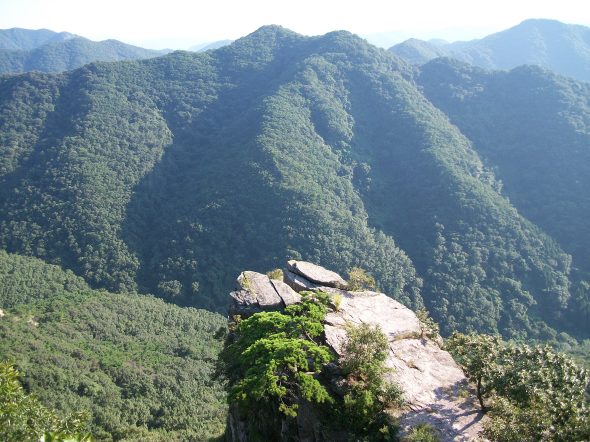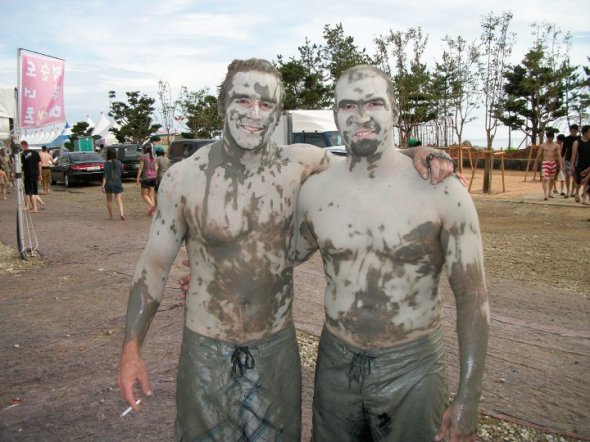I’m standing in the emergency room looking at x-rays of my torso over the shoulders of Mr. Park and a doctor whose name I didn’t catch. They’ve been speaking to each other for quite some time, and neither feels any immediate urge to bring me into the conversation just yet. I’m still not sure if it’s a quality that is shared by other languages I don’t speak, but humorless Korean dialogue always sounds deadly serious to me. This could very well be magnified by the mysterious pain I’m experiencing in my back.
The other morning I awoke with a curious, mild discomfort in the backside of my ribs on the left side. I thought little of it and went to the gym. The next morning I woke up to a more severe and immediate discomfort and became convinced that my workout must have aggravated something back there. A few days passed and I began to feel better. Then earlier tonight while teaching a private lesson, stretching in my chair while my student butchers the pronunciation of rural, I’m digging and poking and feeling around near where I imagine the problem must lie, when something gives. There is a distinct pop or snap, and it’s so absurd and unexpected that I can’t help but laugh. I ask my student if she heard it, but she only looks at me with that curious, canine tilt of the head that universally communicates bewilderment. An hour later in the teachers’ lounge I sneeze, and it drops me like a bullet fired from a sniper rifle hidden in the dark recesses of the building across the street. It feels as if the impossibly strong mechanical arm of an iron monkey has grasped one of the bones of my ribcage and begun to twist and swing. My mouth is agape, and breathing becomes a concentrated effort. It gradually subsides, and I’m able to request transport to my current location.
It’s not a place I’d hoped to visit during my stay in the Republic of Korea. It looks more like an army barracks than a hospital. There are no curtains hung for privacy, and I bear witness to suffering more profound than my own on at least one bed in a dimly lit corner in the back. After much gesticulation and a seemingly endless conversation concerning–presumably–the results of my x-rays and–hopefully–my well-being, Mr. Park turns to me and says, “He doesn’t see anything.” This confirms what I’ve long-believed about doctors: they’re not worth visiting unless you already know what’s wrong with you. They hand me some non-narcotic pills for the pain and shoot me in the ass with something that disappointingly packs no euphoric punch.
The following day Mr. Park picks me up for a return trip to the same hospital where it is suggested that I receive a CT scan. As I sit uncomfortably awaiting the results from the scan, I begin to consider all the new and wonderful challenges being put to my body’s various systems in this foreign environment. I imagine exciting mutations of strains of viruses taking place under a microscopic eye. Is not the common Korean cold uncommon to my American immune system? I begin to confront the ugliness that hospital waiting rooms rub our noses in. I remember hearing somewhere that the quickest way to give yourself cancer is to run around worrying that you have it. If only that were true of larger penises. How does that work anyway? The very act of trying not to think about something always ensures that I devote all of my psychic powers on precisely that thing. Is it like a swear jar in the mind that slowly fills with each passing thought of the word until the jar overflows, reaching critical mass? See, I’m afraid to even mention it again. I’ve already said it once. It reminds me of attending church as a child and trying–but failing miserably–not to think of sodomy and sin.
Finally, I’m pulled into a private room for a repeat of last night’s performance of me wondering anxiously as to what is being said about my mutinous ribcage. Jaws part. Words fall out. Fingers point. Eyes lose focus. Mr Park turns to me and says, “He doesn’t see anything.” They tell me that they can only treat me for the pain and send me on my way. I am escorted to another room, on another floor, where I am told that I will receive injection therapy. This involves more than a few injections of more than a few drugs into an inexact, nonspecific approximation of the pain site. I recall mentioning once before the trust that is implicit in purchasing over the counter medication here. I think of this as upping the stakes a little.
When the doctor is finished he talks at me from my right. Mr. Park translates on my left.
“The doctor wants to know how you feel,” he says.
“I feel like a pincushion.”
“He says that you may feel some soreness back there over the next few days.”
“I already feel soreness back there. I thought that’s why we were here. ”
“Yes, but you may feel more sore because of the many injections he has given you.” I shit you not, that’s what he says to me.
Days pass. Weeks pass. I teach. I make a trip to Busan to reconnect with friends there. I feel better but the discomfort lingers and dies slowly like the memory of something precious that has been lost forever. I can’t help but prod the soreness as if I might learn something more about what is happening to me. I find a place that hurts when I push on it … so I push on it. I find another, and another, and I push on those as well. I’m positively certain I can feel one of the bones of my ribcage depress like a piano key. At least I think I’m positively certain. I search the other side of my back for inconsistencies with my left hand. God forbid I find something there that hurts as well.
I eventually tire of this self-flagellation and decide to learn how to snowboard over the Lunar New Year holiday. After three straight days of landing on my ass, elbows, knees and face, the pain in my ribs is an inaudible whisper beneath the screams of these new bruises. The puzzle of how to stay upright under such bizarre circumstances is healthy for my cyclical mind. The slopes are unforgiving, and I am beaten and punished for every mistake I make, and I make a lot. Like anything worth doing in Korea, it is done amid throngs of people on all sides and at every turn. There are at least two occasions where I take out other skiers at the knees. Our limbs violently intertwine and we slide as helpless prisoners of gravity until we slow and eventually stop in an awkward, asexual 69. Somehow throughout the process I get better. I learn something. I fall less, until I’m only stopping myself when I do it on purpose to avoid wearing Korean kids like bug shit on my rental gear.
It’s one of many experiences that remind me I am doing wrong by my country. The other day I ordered two sandwiches to go from the KFC in the bus terminal. Before they were ready I changed my mind and decided that I would take a seat and eat them inside the restaurant. I took up an entire table to eat the food that I moments ago had announced I would be taking out. I am Korea’s shining example of every foreigner’s unfailing stupidity and complete ineptitude for assimilation into other cultures beyond their own. As if we don’t have takeout where I come from. As if we don’t have KFC. America is held accountable for all the dumb shit I’ve done since I arrived here. I am your bumbling ambassador. I spoke exclusively in Spanish for the first three weeks that I was here. I’ve blackened each eye. One from falling up a mountain. One from walking into a closed door. My latest feat: a trip to the emergency room for an injury that I apparently managed to sustain in my sleep.








